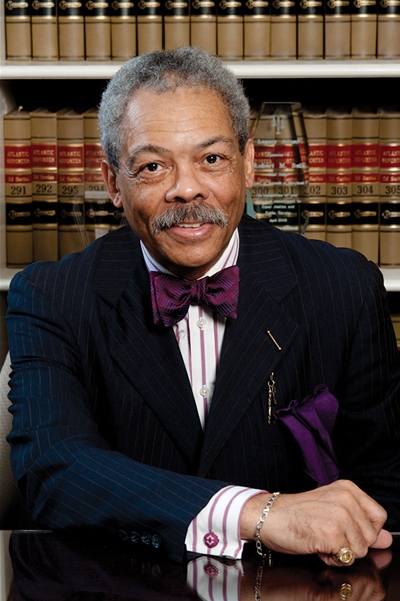Maryland Court of Appeals (Retired)

Harvard Law School, Jurist Doctorate - 1969
Morgan State College, Bachelor of Arts Degree (AB) - History - 1966
The Honorable Robert M. Bell was born in Rocky Mount, North Carolina. His parents soon moved to Baltimore, Maryland, where he attended Dunbar High School. On June 17, 1960, Bell had his first experiences with the judicial system. While still in high school, he and a group of other students participated in a sit-in protest at a segregated restaurant. The group entered Hooper's Restaurant, located at Charles and Fayette Streets in downtown Baltimore, and waited to be served. They were asked to leave, but twelve of the students, including the sixteen-year-old Bell, refused. He and the other students were arrested, convicted in the Circuit Court of Baltimore City of criminal trespassing and fined $10. The case was appealed to the Maryland Court of Appeals, where the students' representation included Juanita Jackson Mitchell and Thurgood Marshall. The appellants argued that the use of the state's trespassing laws to support segregation of public accommodations violated the Fourteenth Amendment to the United States Constitution. In 1962, the Court of Appeals upheld the decision of the circuit court.
The case was then appealed to the U.S Supreme Court, where Bell was represented by Constance Baker Motley and Jack Greenberg. In the 1964 case of Bell v. Maryland, the U.S. Supreme Court, noting that in the period since the conviction, the Maryland General Assembly had passed a public accommodations law, refused to rule whether the state's trespassing laws could be used to exclude blacks from public accommodations, but vacated the decision and remanded the case to allow the state court to rule whether the conviction should be reversed due to the change in state law. On April 9, 1965, Bell's conviction was reversed by the state Court of Appeals, and all of the students were cleared of all charges.
Ironically, after the Supreme Court's decision, Congress passed the Civil Rights Act of 1964, which banned racial discrimination in public accommodations such as those provided in Hooper's Baltimore restaurant. It has been suggested that the Supreme Court refrained from reaching the merits in the case in consideration of this civil rights legislation, which was then pending in Congress, as had it done so it would have eliminated the basis for passing the Act.
Bell later attended and graduated with a B.A. in history from what was then Morgan State College in Baltimore in 1966 and while there became a brother in Alpha Phi Omega. He then was admitted to Harvard Law School, where he earned his J.D. in 1969. That same year, he was admitted to the bar and began his legal practice in Baltimore.
In 1975, Bell was appointed to the District Court of Maryland, District 1, in Baltimore City and served there until 1980. He was an Associate Judge, Baltimore City Circuit Court, 8th Judicial Circuit, from 1980 to 1984, when he was appointed to the Maryland Court of Special Appeals. Seven years later he was appointed to the state's highest court and became the chief justice in 1996. He was a member of the Court of Appeals Standing Committee on Rules of practice and Procedure from 1977 to 1982; the Commission to Revise the Annotated Code of Maryland, 1980-82; and the Board of Directors, Judicial Institute of Maryland, 1982-84. In August 2006, Bell was named Chair of the National Center for State Courts' Board of Directors. At the same time, Judge Bell also was named president of the Conference of Chief Justices.

Bell has also been the recipient of numerous awards, among them: the American Bar Association D'Alemberte-Raven Award for Outstanding Leadership in Alternative Dispute Resolution; the Legal Excellence Award for Advancement of Public Service Responsibility from the Maryland Bar Foundation; the Maryland Network Against Domestic Violence Special Recognition Award; the Maryland Leadership in Law Award; and the Maryland Legal Services Corporation Medal for Access to Justice.


